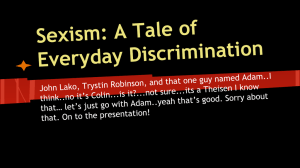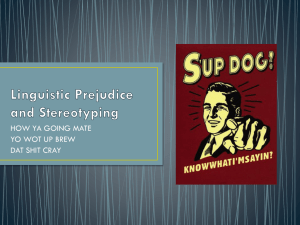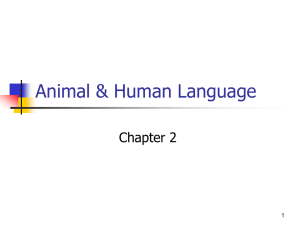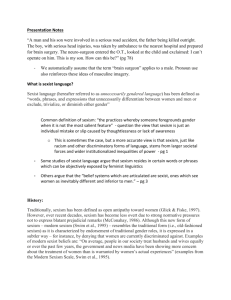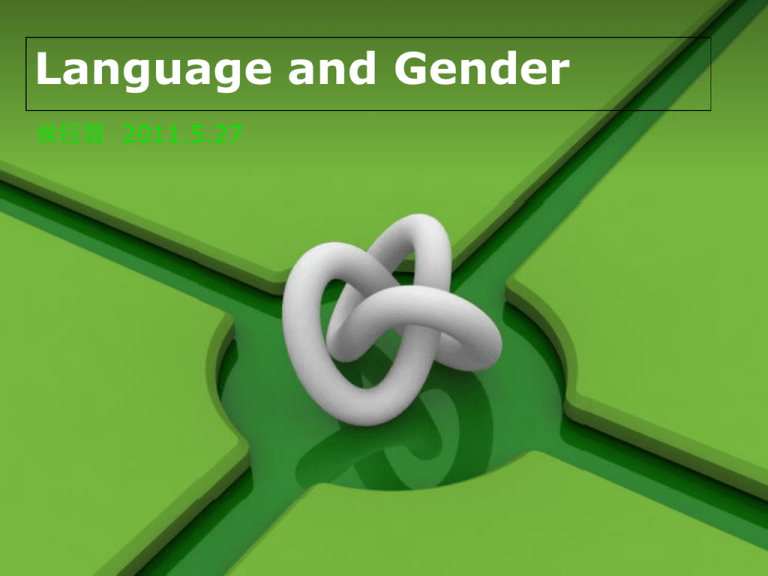
Language and Gender
侯钰璐 2011.5.27
Two Concepts
Sex Vs. Gender
v Sex is what you’re born with. Gender is
what you’re given.
v Sex: one’s biological property, a
matter of physiology
v Gender: one’s social property,
learned behavior
The Importance of the Issue
Gender Differences in Language Use
Major Models to Explain the Differences
Linguistic Sexism
Suggestions for Cross-Gender Communication
You are what you say.
By Robin Lakoff
The Importance of the Issue
Language is a
mirror of society,
through which we
can understand
social activities of a
certain society
better.
Sociolinguistics
v Why is it important?
Society provides
language with a
suitable context of
use, in which we
can enjoy aspects
of language vividly
and truthfully
v Why is it critical not to overlook the social
aspect of language?
Social Parameters
Class
Age
Religious Belief
Education
Language
Gender
Ethnic Identity
Background
Two millenniums ago: ancient Greek drama
1922: Otto Jespersen, Language: Its Nature, Development
and Origin
1960s: feminist movement, the rise of gender studies
.
1970s: Lakoff, Labove, Trudgill. Since then, gender and
language has become a focus in the linguistic field.
1999: the 44th International Linguistic Association took
“Gender and Language” as the central subject under
discussion
The Importance of the Issue
Gender Differences in Language Use
Major Models to Explain the Differences
Linguistic Sexism
Suggestions for Cross-Gender Communication
Gender Differences in Language Use
v Robin Lakoff, Language and Women’s Place,
1975
v Lexical differences
v Syntactic differences
v Other differences
Gender Differences in Language Use
Lexical Differences
v 1. Color-words
v E.g. The wall is mauve.
v
I prefer the lavender wallpaper.
v
beige, ecru, aquamarine…
v 2. Swear-words
v E.g. (a) Shit, you’ve put the peanut butter in the
refrigerator again.
v
(b) Oh dear, you’ve put the peanut butter in the
refrigerator again.
shit, damn, hell, fuck..
oh dear, fudge, goodness, dear me…
v
Gender Differences in Language Use
Lexical Differences
v 3. Empty adjectives
v E.g. (a) What a terrific idea!
v
(b) What a divine idea!
v
divine, adorable, gorgeous…
v 4. Intensifiers
v E.g. terrible, awful, so, very, quite
Gender Differences in Language Use
Syntactic Differences
v 5. Tag-question
v E.g. (a) Is John here?
v
(b) John is here, isn’t here?
v
v
You don’t mind eating this, do you?
v 6. Hedges
v phrases like “sort of”, “kind of”, “I guess”, “it
seems like”…
v
Gender Differences in Language Use
Syntactic Differences
v 7. Intonational patterns
v E.g. --When will dinner be ready?
v
--Oh…around six o’clock?
v
v
v
v
v
v
v
v
v
v
8. Compound requests
E.g. (a) Close the door.
(b) Please close the door.
(c) Will you close the door?
(d) Will you please close the door?
(e) Won’t you close the door?
“Would you mind…”
“If it’s not too much to as…”
“Is it ok if…”
“I’m sorry, but I think that…”
Gender Differences in Language Use
Other Differences
v
v
v
v
9. Topic Selection
Men: Politics, economy, sports, religion…
Women: children, food, health, family, fashion…
Serious Vs Trivial?
v
v
v
v
v
10. Amount of Speech
“Women never stop talking”.
“Three women and a goose make a market”.
Is this true?
Public Vs Private
v
Gender Differences in Language Use
Other Differences
v 11. Turn-taking
v Women are more likely to obey the rules of turntaking, while men often take other speakers’ turn to
gain control of the whole conversation.
v 12. Overlap and Interruption
v Zimmerman and West (1975) recorded 31
conversations in public (20 single-gender, 11 mixedgender), all of the overlaps and 46 of 48
interruptions were caused by male speakers.
v
The Importance of the Issue
Gender Differences in Language Use
Major Models to Explain the Differences
Linguistic Sexism
Suggestions for Cross-Gender Communication
Major Models
to Explain the Differences
Deficit
(Robin Lakoff)
Dominance
(D. Zimmerman, C. West,
P. Fishman)
Difference
Deborah Tanne, M.H. Goodwin)
Politeness
(Janet Holmes)
Constructionism
(Deborah Cameron)
The Importance of the Issue
Gender Differences in Language Use
Major Models to Explain the Differences
Linguistic Sexism
Suggestions for Cross-Gender Communication
Linguistic Sexism
v Language of Women
v Language about Women
v Def. of linguistic sexism:
v A term used to refer to sexbiased phenomena in
language use.
Examples of Linguistic Sexism
v 1. Masculine forms in English
v Man is mortal.
v The emergency room is manned (be operated by man)
by…
v (When writing a letter) Dear sir…
v
v
v
v
salesman- sales assistant
storeman- sto re assistant
postman - letter carrier, mail carrier, postal
fireman- fire fighter
Examples of Linguistic Sexism
v
v
v
v
v
v
2. suffix: –ess, -ette, -rix, -enne,
actress actor
ambassadress ambassador
suffragette suffragist
usherette usher
comedienne comedian
v
v
v
v
v
v
3. Implied derogatory words
Master- Mistress
Governor- Governess
Bachelor-Spinster
(a) He is a professional.
(b)She is a professional.
The Importance of the Issue
Gender Differences in Language Use
Major Models to Explain the Differences
Linguistic Sexism
Suggestions for Cross-Gender Communication
Suggestions for Cross-Gender
Communication
v Identifying Differences in
Language Use
v Increasing Mutual Cognition
v Trying to Be Flexible

